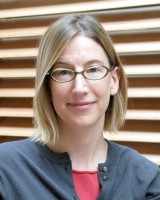A team of researchers is working on a multi-year study in coastal communities from Bristol Bay to Sitka.
But unlike their counterparts in the biological sciences, this university team is not studying fish, or marine mammals, or forest ecosystems. They’re studying us.
Listen to iFriendly audio.
Those early researchers documented Alaska’s indigenous cultures, and how they survived and thrived in adverse conditions.
Karen Hebert (pronounced “eh-BEAR”) is an anthropologist at Yale University. She’s still interested in how we’re coping with adversity.
“Alaskan communities face a whole range of really important resource issues, especially on Alaskan coasts. But there’s also a lot that’s also underway here by region residents to tackle the issues that people feel are most important for the future.”
Hebert has spent much of the summer in the Bristol Bay area conducting interviews. Her collaborators have been working in Southeast in Sitka and Hoonah. They’re examining the parallels between the two regions as they confront mining, fisheries, and timber issues.
This is year one of a three-year study. Hebert and her team are not working from the sidelines. In this project, cultural anthropology and ethnography are hands-on.
“Which is trying to understand people’s ideas from their own perspectives, how they come to see the world the way they do, why they feel certain issues are important. And we get at that by trying to attend community meetings, and interact with people in normal everyday settings. Get a sense of what people are talking about when we’re not driving the questions, even though everyone knows we’re researchers, and also sit down and have pretty in-depth, semi-structured interviews so we can find out what kinds of work and involvement they’ve done, what they’re perspectives are, and why they come to hold the views they do.”
The study is called “Confronting Resource Concerns in Coastal Alaska.” Hebert says she’ll focus on the connection between fisheries and other marine resources, and what happens on land.
“It’s never just the fish.”
Danielle Dinovelli-Lang is an anthropologist from Carleton University in Ottowa.
“It’s something bigger and deeper, about how people and things relate to each other.”
Dinovelli-Lang came to the project after doing her dissertation work in the village of Hoonah. She says she was looking for the most central issue to people’s lives in the community — the issue that shaped most all other issues.
It turned out to be subsistence. Dinovelli-Lang is lending her expertise in subsistence to this project.
“The US government has this vast subsistence management program that’s something that if you’re not Alaskan is just totally crazy and mysterious. So understanding why it’s so important to the government at that level, why it’s so important to the state, why it’s so important to individuals, and how that plays out throughout this region.”
The third collaborator in the study is Yale School of Forestry graduate student Taylor Reese. She brings an interest in terrestrial resources to the study, and corrals subjects to interview.
“An assortment of everyone, really. From people involved in all the major resource concern organizations, from ALFA and SCS, to broader organizations including TNC and TU.”
That’s the Alaska Longline Fisherman’s Association, Sitka Conservation Society, The Nature Conservancy, and Trout Unlimited. But anyone is a candidate.
“We’re talking to fishermen, and loggers, and community members — ones that are really rooted in the subsistence culture, and ones that aren’t necessarily.”
The three will be back next year for another round of interviews in both Southeast and Bristol Bay. The third year will be for analysis and conclusions. Hebert knows a lot of academic work has been done demonstrating that these areas of Alaska are vulnerable to changes in the environment and the availability of resources. But we also have a distinctive capacity to form coalitions to promote sustainability.
How we survive and thrive is not only important for us to understand, but it also may be a lesson for others.
“This region probably has a lot to teach coastal communities across the world that are confronting similar concerns.”































